Unit 35: HR Development for Individuals, Teams, and Organisations
VerifiedAdded on 2020/12/09
|20
|4992
|322
Report
AI Summary
This report provides a comprehensive analysis of HR development within organizations, focusing on the skills, knowledge, and behaviors required by HR professionals. It begins with a mini-research to determine essential HR competencies, followed by a personal skills audit and professional development plan. The report then explores the differences between organizational and individual learning, using the Whirlpool case study as a reference. It emphasizes the importance of continuous learning and professional development for sustainable business performance, again referencing Whirlpool. The report also examines how High-Performance Working (HPW) contributes to employee engagement and competitive advantage, and concludes with an evaluation of different approaches to performance management. The content covers a range of topics including employee relations, communication, negotiation, and teamwork, providing a detailed overview of HR practices and strategies.
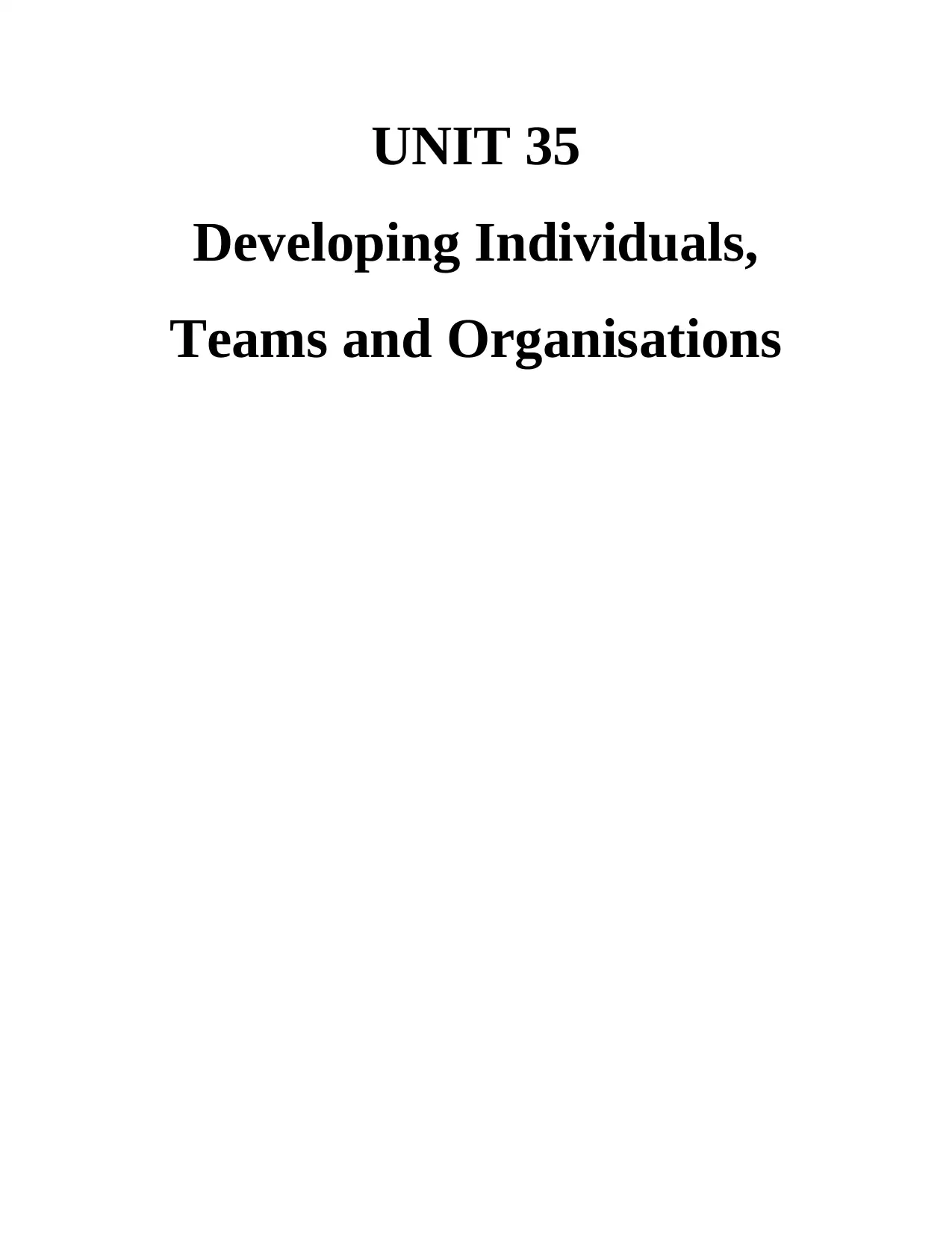
UNIT 35
Developing Individuals,
Teams and Organisations
Developing Individuals,
Teams and Organisations
Paraphrase This Document
Need a fresh take? Get an instant paraphrase of this document with our AI Paraphraser
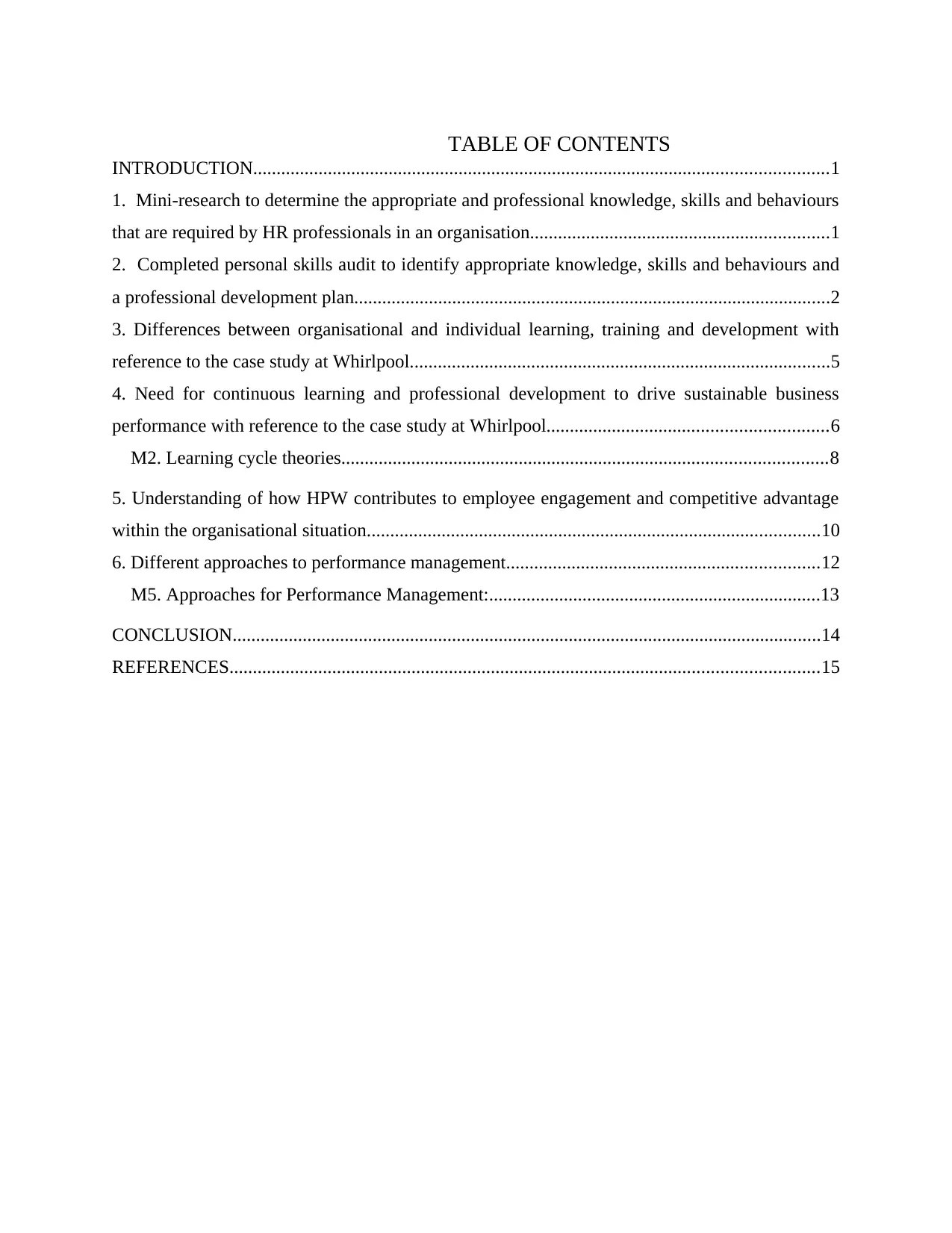
TABLE OF CONTENTS
INTRODUCTION...........................................................................................................................1
1. Mini-research to determine the appropriate and professional knowledge, skills and behaviours
that are required by HR professionals in an organisation................................................................1
2. Completed personal skills audit to identify appropriate knowledge, skills and behaviours and
a professional development plan......................................................................................................2
3. Differences between organisational and individual learning, training and development with
reference to the case study at Whirlpool..........................................................................................5
4. Need for continuous learning and professional development to drive sustainable business
performance with reference to the case study at Whirlpool............................................................6
M2. Learning cycle theories........................................................................................................8
5. Understanding of how HPW contributes to employee engagement and competitive advantage
within the organisational situation.................................................................................................10
6. Different approaches to performance management...................................................................12
M5. Approaches for Performance Management:.......................................................................13
CONCLUSION..............................................................................................................................14
REFERENCES..............................................................................................................................15
INTRODUCTION...........................................................................................................................1
1. Mini-research to determine the appropriate and professional knowledge, skills and behaviours
that are required by HR professionals in an organisation................................................................1
2. Completed personal skills audit to identify appropriate knowledge, skills and behaviours and
a professional development plan......................................................................................................2
3. Differences between organisational and individual learning, training and development with
reference to the case study at Whirlpool..........................................................................................5
4. Need for continuous learning and professional development to drive sustainable business
performance with reference to the case study at Whirlpool............................................................6
M2. Learning cycle theories........................................................................................................8
5. Understanding of how HPW contributes to employee engagement and competitive advantage
within the organisational situation.................................................................................................10
6. Different approaches to performance management...................................................................12
M5. Approaches for Performance Management:.......................................................................13
CONCLUSION..............................................................................................................................14
REFERENCES..............................................................................................................................15
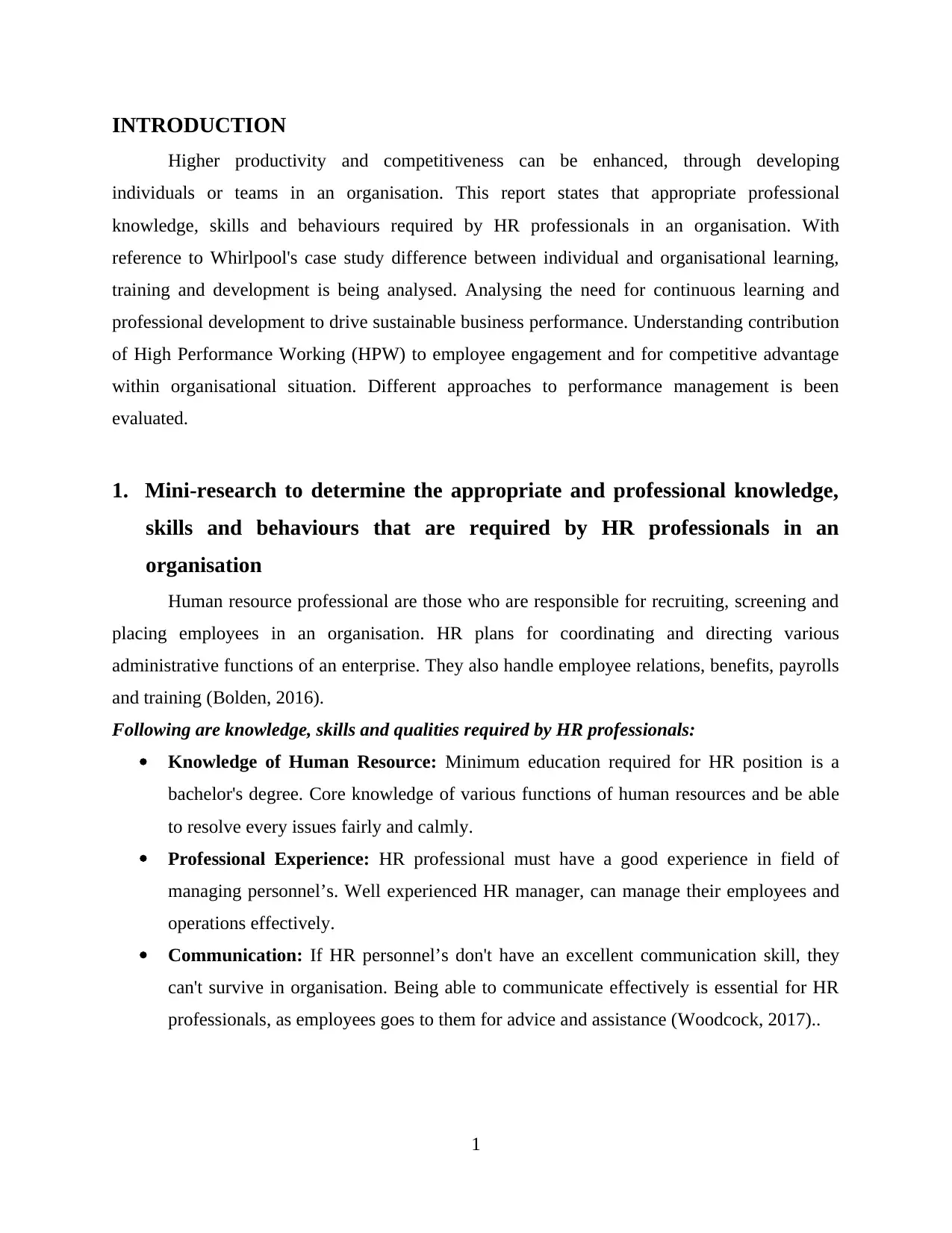
INTRODUCTION
Higher productivity and competitiveness can be enhanced, through developing
individuals or teams in an organisation. This report states that appropriate professional
knowledge, skills and behaviours required by HR professionals in an organisation. With
reference to Whirlpool's case study difference between individual and organisational learning,
training and development is being analysed. Analysing the need for continuous learning and
professional development to drive sustainable business performance. Understanding contribution
of High Performance Working (HPW) to employee engagement and for competitive advantage
within organisational situation. Different approaches to performance management is been
evaluated.
1. Mini-research to determine the appropriate and professional knowledge,
skills and behaviours that are required by HR professionals in an
organisation
Human resource professional are those who are responsible for recruiting, screening and
placing employees in an organisation. HR plans for coordinating and directing various
administrative functions of an enterprise. They also handle employee relations, benefits, payrolls
and training (Bolden, 2016).
Following are knowledge, skills and qualities required by HR professionals:
Knowledge of Human Resource: Minimum education required for HR position is a
bachelor's degree. Core knowledge of various functions of human resources and be able
to resolve every issues fairly and calmly.
Professional Experience: HR professional must have a good experience in field of
managing personnel’s. Well experienced HR manager, can manage their employees and
operations effectively.
Communication: If HR personnel’s don't have an excellent communication skill, they
can't survive in organisation. Being able to communicate effectively is essential for HR
professionals, as employees goes to them for advice and assistance (Woodcock, 2017)..
1
Higher productivity and competitiveness can be enhanced, through developing
individuals or teams in an organisation. This report states that appropriate professional
knowledge, skills and behaviours required by HR professionals in an organisation. With
reference to Whirlpool's case study difference between individual and organisational learning,
training and development is being analysed. Analysing the need for continuous learning and
professional development to drive sustainable business performance. Understanding contribution
of High Performance Working (HPW) to employee engagement and for competitive advantage
within organisational situation. Different approaches to performance management is been
evaluated.
1. Mini-research to determine the appropriate and professional knowledge,
skills and behaviours that are required by HR professionals in an
organisation
Human resource professional are those who are responsible for recruiting, screening and
placing employees in an organisation. HR plans for coordinating and directing various
administrative functions of an enterprise. They also handle employee relations, benefits, payrolls
and training (Bolden, 2016).
Following are knowledge, skills and qualities required by HR professionals:
Knowledge of Human Resource: Minimum education required for HR position is a
bachelor's degree. Core knowledge of various functions of human resources and be able
to resolve every issues fairly and calmly.
Professional Experience: HR professional must have a good experience in field of
managing personnel’s. Well experienced HR manager, can manage their employees and
operations effectively.
Communication: If HR personnel’s don't have an excellent communication skill, they
can't survive in organisation. Being able to communicate effectively is essential for HR
professionals, as employees goes to them for advice and assistance (Woodcock, 2017)..
1
⊘ This is a preview!⊘
Do you want full access?
Subscribe today to unlock all pages.

Trusted by 1+ million students worldwide
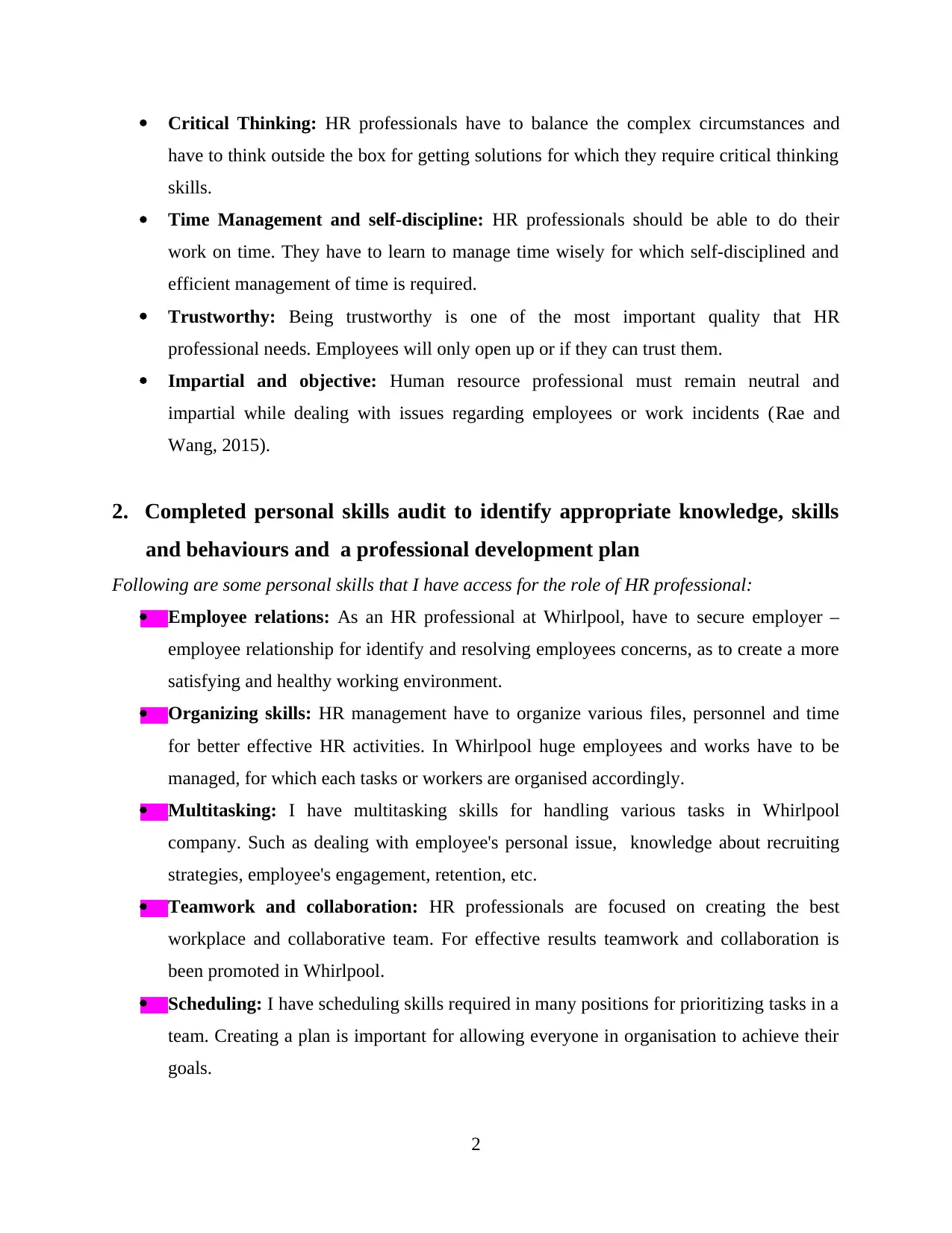
Critical Thinking: HR professionals have to balance the complex circumstances and
have to think outside the box for getting solutions for which they require critical thinking
skills.
Time Management and self-discipline: HR professionals should be able to do their
work on time. They have to learn to manage time wisely for which self-disciplined and
efficient management of time is required.
Trustworthy: Being trustworthy is one of the most important quality that HR
professional needs. Employees will only open up or if they can trust them.
Impartial and objective: Human resource professional must remain neutral and
impartial while dealing with issues regarding employees or work incidents (Rae and
Wang, 2015).
2. Completed personal skills audit to identify appropriate knowledge, skills
and behaviours and a professional development plan
Following are some personal skills that I have access for the role of HR professional:
Employee relations: As an HR professional at Whirlpool, have to secure employer –
employee relationship for identify and resolving employees concerns, as to create a more
satisfying and healthy working environment.
Organizing skills: HR management have to organize various files, personnel and time
for better effective HR activities. In Whirlpool huge employees and works have to be
managed, for which each tasks or workers are organised accordingly.
Multitasking: I have multitasking skills for handling various tasks in Whirlpool
company. Such as dealing with employee's personal issue, knowledge about recruiting
strategies, employee's engagement, retention, etc.
Teamwork and collaboration: HR professionals are focused on creating the best
workplace and collaborative team. For effective results teamwork and collaboration is
been promoted in Whirlpool.
Scheduling: I have scheduling skills required in many positions for prioritizing tasks in a
team. Creating a plan is important for allowing everyone in organisation to achieve their
goals.
2
have to think outside the box for getting solutions for which they require critical thinking
skills.
Time Management and self-discipline: HR professionals should be able to do their
work on time. They have to learn to manage time wisely for which self-disciplined and
efficient management of time is required.
Trustworthy: Being trustworthy is one of the most important quality that HR
professional needs. Employees will only open up or if they can trust them.
Impartial and objective: Human resource professional must remain neutral and
impartial while dealing with issues regarding employees or work incidents (Rae and
Wang, 2015).
2. Completed personal skills audit to identify appropriate knowledge, skills
and behaviours and a professional development plan
Following are some personal skills that I have access for the role of HR professional:
Employee relations: As an HR professional at Whirlpool, have to secure employer –
employee relationship for identify and resolving employees concerns, as to create a more
satisfying and healthy working environment.
Organizing skills: HR management have to organize various files, personnel and time
for better effective HR activities. In Whirlpool huge employees and works have to be
managed, for which each tasks or workers are organised accordingly.
Multitasking: I have multitasking skills for handling various tasks in Whirlpool
company. Such as dealing with employee's personal issue, knowledge about recruiting
strategies, employee's engagement, retention, etc.
Teamwork and collaboration: HR professionals are focused on creating the best
workplace and collaborative team. For effective results teamwork and collaboration is
been promoted in Whirlpool.
Scheduling: I have scheduling skills required in many positions for prioritizing tasks in a
team. Creating a plan is important for allowing everyone in organisation to achieve their
goals.
2
Paraphrase This Document
Need a fresh take? Get an instant paraphrase of this document with our AI Paraphraser
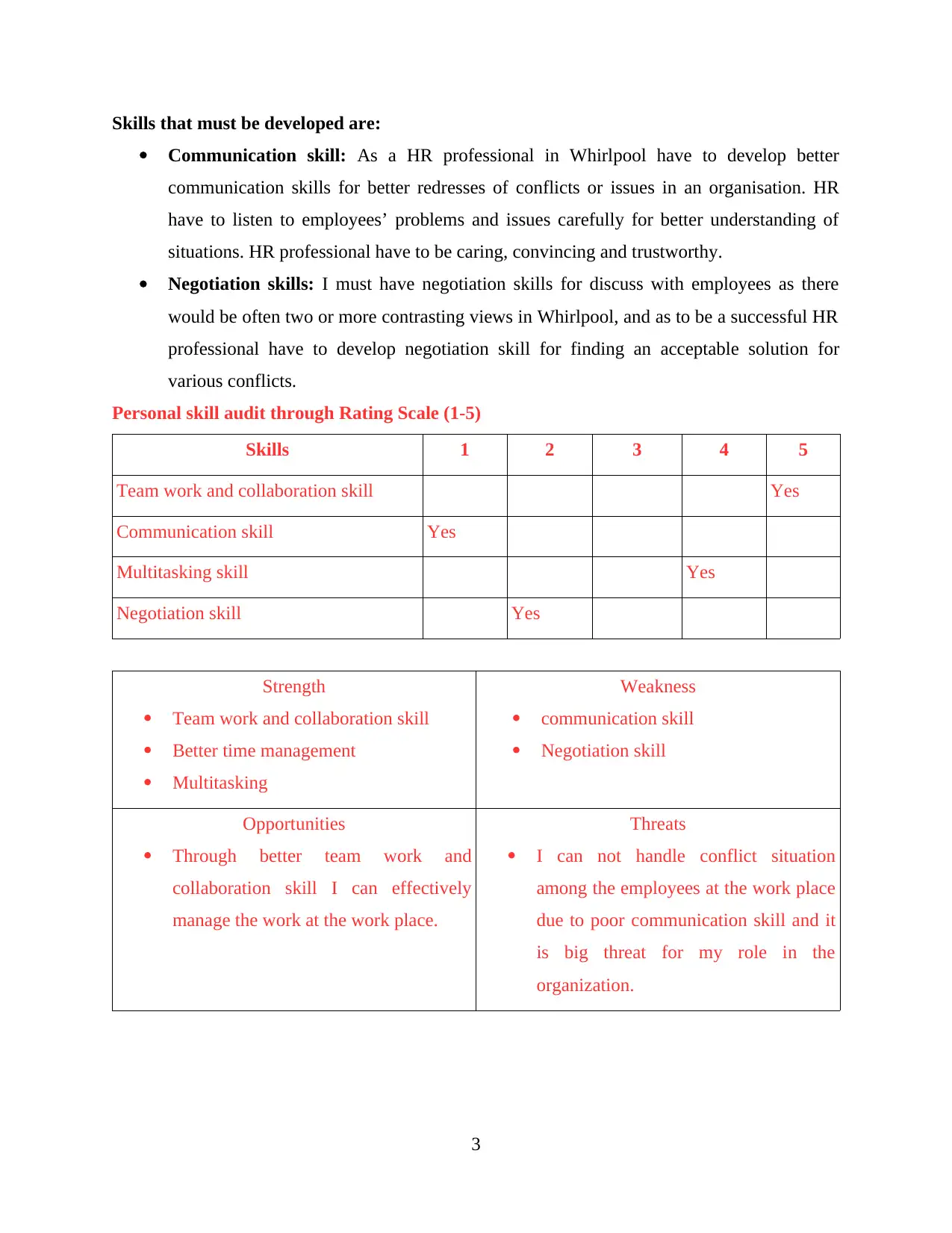
Skills that must be developed are:
Communication skill: As a HR professional in Whirlpool have to develop better
communication skills for better redresses of conflicts or issues in an organisation. HR
have to listen to employees’ problems and issues carefully for better understanding of
situations. HR professional have to be caring, convincing and trustworthy.
Negotiation skills: I must have negotiation skills for discuss with employees as there
would be often two or more contrasting views in Whirlpool, and as to be a successful HR
professional have to develop negotiation skill for finding an acceptable solution for
various conflicts.
Personal skill audit through Rating Scale (1-5)
Skills 1 2 3 4 5
Team work and collaboration skill Yes
Communication skill Yes
Multitasking skill Yes
Negotiation skill Yes
Strength
Team work and collaboration skill
Better time management
Multitasking
Weakness
communication skill
Negotiation skill
Opportunities
Through better team work and
collaboration skill I can effectively
manage the work at the work place.
Threats
I can not handle conflict situation
among the employees at the work place
due to poor communication skill and it
is big threat for my role in the
organization.
3
Communication skill: As a HR professional in Whirlpool have to develop better
communication skills for better redresses of conflicts or issues in an organisation. HR
have to listen to employees’ problems and issues carefully for better understanding of
situations. HR professional have to be caring, convincing and trustworthy.
Negotiation skills: I must have negotiation skills for discuss with employees as there
would be often two or more contrasting views in Whirlpool, and as to be a successful HR
professional have to develop negotiation skill for finding an acceptable solution for
various conflicts.
Personal skill audit through Rating Scale (1-5)
Skills 1 2 3 4 5
Team work and collaboration skill Yes
Communication skill Yes
Multitasking skill Yes
Negotiation skill Yes
Strength
Team work and collaboration skill
Better time management
Multitasking
Weakness
communication skill
Negotiation skill
Opportunities
Through better team work and
collaboration skill I can effectively
manage the work at the work place.
Threats
I can not handle conflict situation
among the employees at the work place
due to poor communication skill and it
is big threat for my role in the
organization.
3
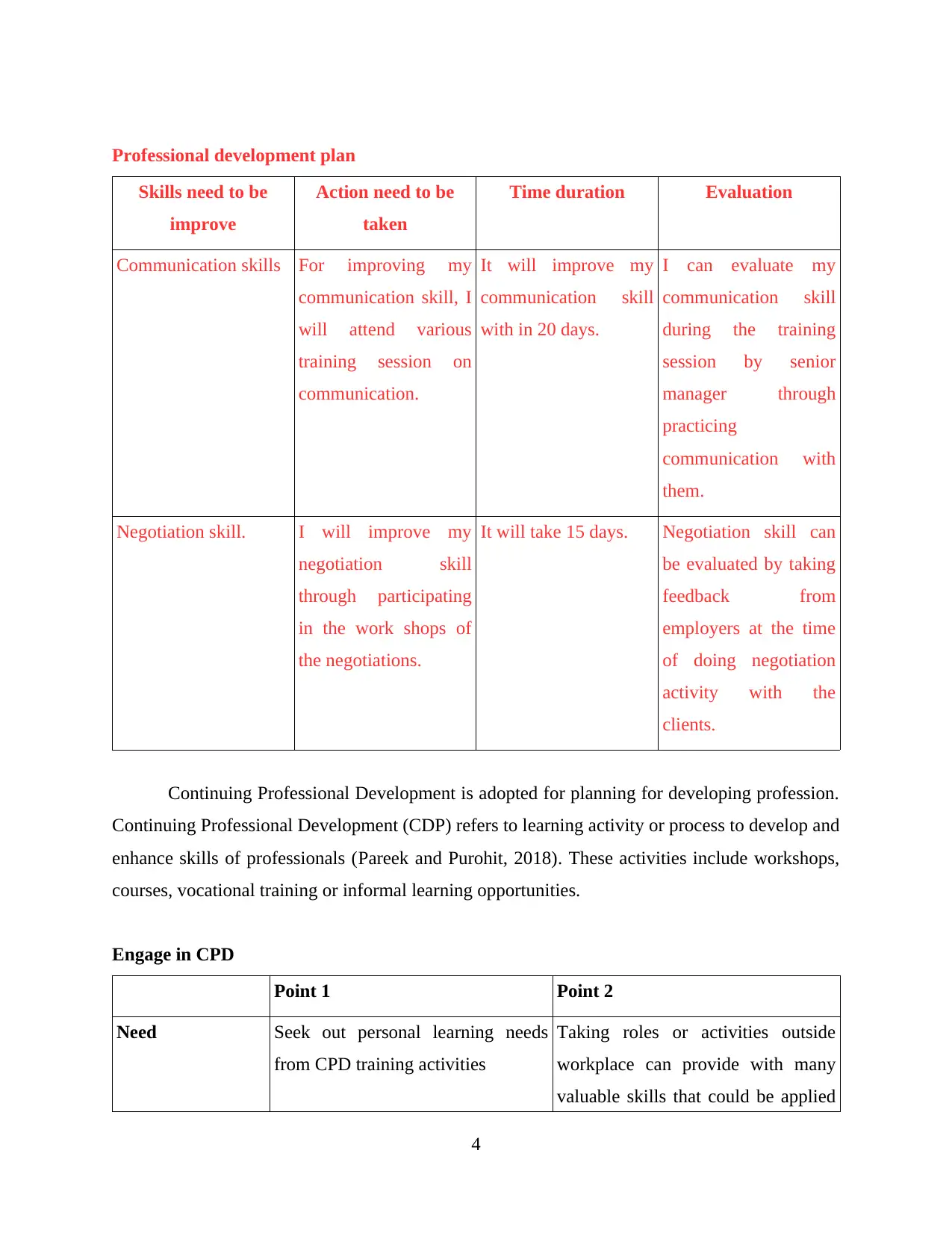
Professional development plan
Skills need to be
improve
Action need to be
taken
Time duration Evaluation
Communication skills For improving my
communication skill, I
will attend various
training session on
communication.
It will improve my
communication skill
with in 20 days.
I can evaluate my
communication skill
during the training
session by senior
manager through
practicing
communication with
them.
Negotiation skill. I will improve my
negotiation skill
through participating
in the work shops of
the negotiations.
It will take 15 days. Negotiation skill can
be evaluated by taking
feedback from
employers at the time
of doing negotiation
activity with the
clients.
Continuing Professional Development is adopted for planning for developing profession.
Continuing Professional Development (CDP) refers to learning activity or process to develop and
enhance skills of professionals (Pareek and Purohit, 2018). These activities include workshops,
courses, vocational training or informal learning opportunities.
Engage in CPD
Point 1 Point 2
Need Seek out personal learning needs
from CPD training activities
Taking roles or activities outside
workplace can provide with many
valuable skills that could be applied
4
Skills need to be
improve
Action need to be
taken
Time duration Evaluation
Communication skills For improving my
communication skill, I
will attend various
training session on
communication.
It will improve my
communication skill
with in 20 days.
I can evaluate my
communication skill
during the training
session by senior
manager through
practicing
communication with
them.
Negotiation skill. I will improve my
negotiation skill
through participating
in the work shops of
the negotiations.
It will take 15 days. Negotiation skill can
be evaluated by taking
feedback from
employers at the time
of doing negotiation
activity with the
clients.
Continuing Professional Development is adopted for planning for developing profession.
Continuing Professional Development (CDP) refers to learning activity or process to develop and
enhance skills of professionals (Pareek and Purohit, 2018). These activities include workshops,
courses, vocational training or informal learning opportunities.
Engage in CPD
Point 1 Point 2
Need Seek out personal learning needs
from CPD training activities
Taking roles or activities outside
workplace can provide with many
valuable skills that could be applied
4
⊘ This is a preview!⊘
Do you want full access?
Subscribe today to unlock all pages.

Trusted by 1+ million students worldwide
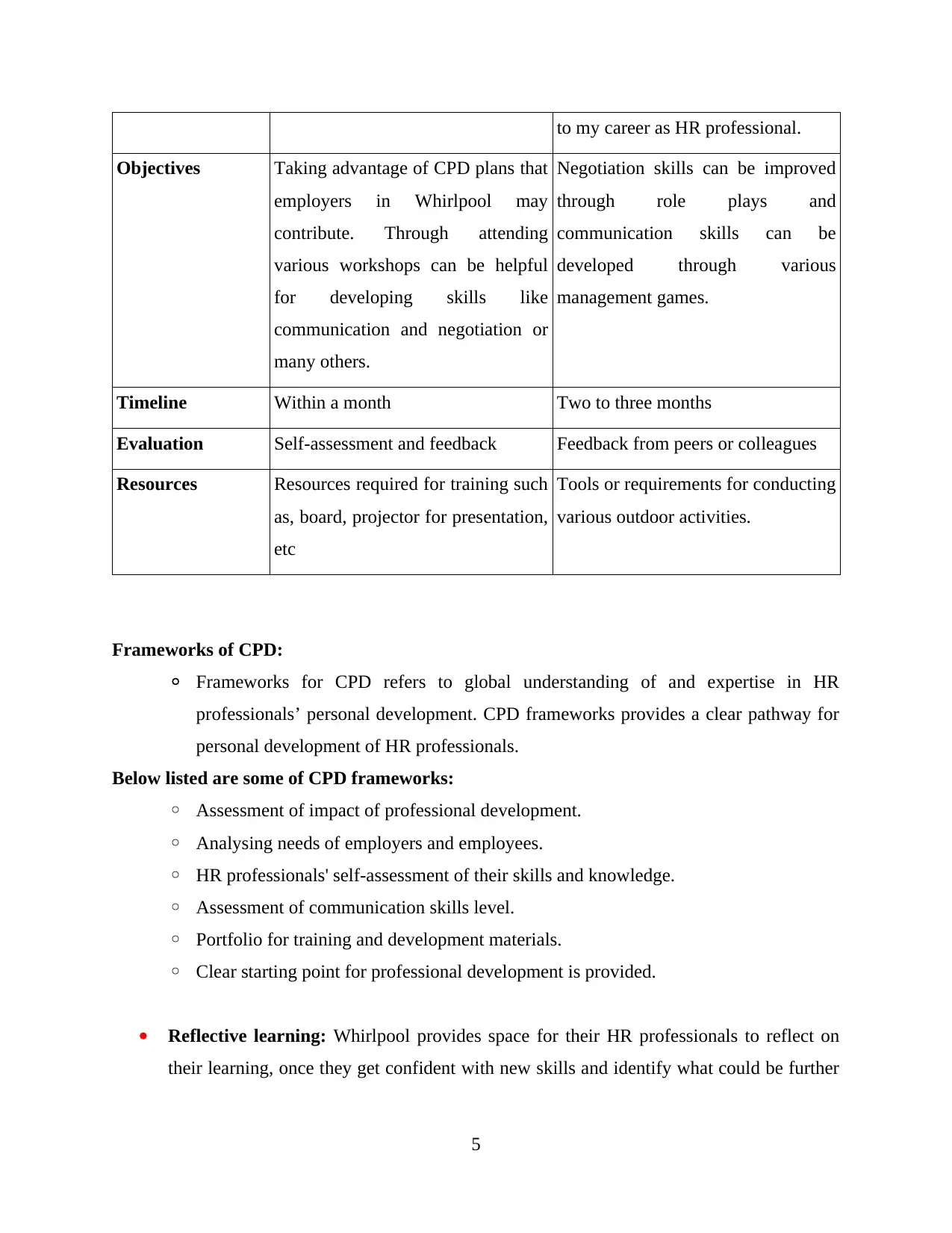
to my career as HR professional.
Objectives Taking advantage of CPD plans that
employers in Whirlpool may
contribute. Through attending
various workshops can be helpful
for developing skills like
communication and negotiation or
many others.
Negotiation skills can be improved
through role plays and
communication skills can be
developed through various
management games.
Timeline Within a month Two to three months
Evaluation Self-assessment and feedback Feedback from peers or colleagues
Resources Resources required for training such
as, board, projector for presentation,
etc
Tools or requirements for conducting
various outdoor activities.
Frameworks of CPD:
◦ Frameworks for CPD refers to global understanding of and expertise in HR
professionals’ personal development. CPD frameworks provides a clear pathway for
personal development of HR professionals.
Below listed are some of CPD frameworks:
◦ Assessment of impact of professional development.
◦ Analysing needs of employers and employees.
◦ HR professionals' self-assessment of their skills and knowledge.
◦ Assessment of communication skills level.
◦ Portfolio for training and development materials.
◦ Clear starting point for professional development is provided.
Reflective learning: Whirlpool provides space for their HR professionals to reflect on
their learning, once they get confident with new skills and identify what could be further
5
Objectives Taking advantage of CPD plans that
employers in Whirlpool may
contribute. Through attending
various workshops can be helpful
for developing skills like
communication and negotiation or
many others.
Negotiation skills can be improved
through role plays and
communication skills can be
developed through various
management games.
Timeline Within a month Two to three months
Evaluation Self-assessment and feedback Feedback from peers or colleagues
Resources Resources required for training such
as, board, projector for presentation,
etc
Tools or requirements for conducting
various outdoor activities.
Frameworks of CPD:
◦ Frameworks for CPD refers to global understanding of and expertise in HR
professionals’ personal development. CPD frameworks provides a clear pathway for
personal development of HR professionals.
Below listed are some of CPD frameworks:
◦ Assessment of impact of professional development.
◦ Analysing needs of employers and employees.
◦ HR professionals' self-assessment of their skills and knowledge.
◦ Assessment of communication skills level.
◦ Portfolio for training and development materials.
◦ Clear starting point for professional development is provided.
Reflective learning: Whirlpool provides space for their HR professionals to reflect on
their learning, once they get confident with new skills and identify what could be further
5
Paraphrase This Document
Need a fresh take? Get an instant paraphrase of this document with our AI Paraphraser
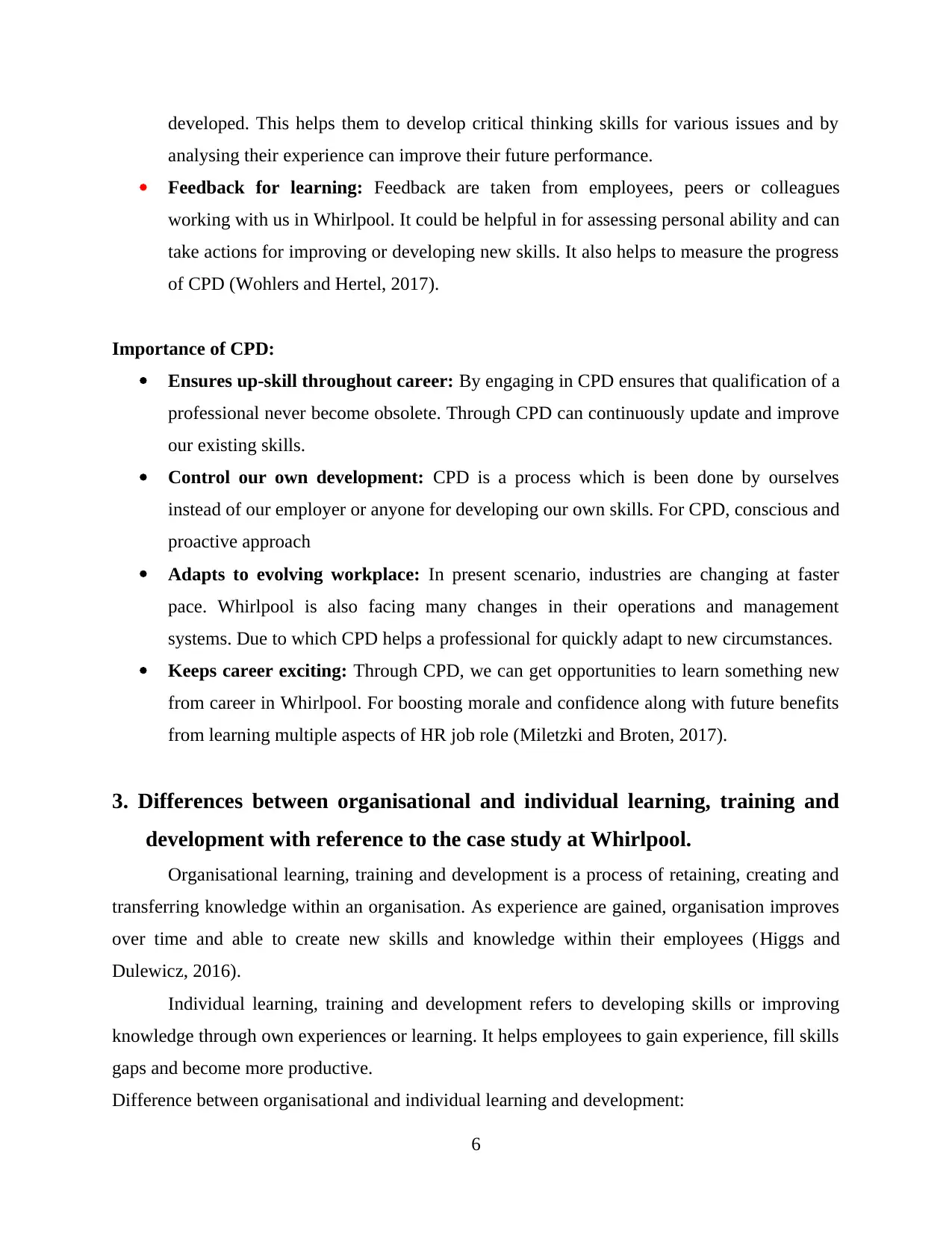
developed. This helps them to develop critical thinking skills for various issues and by
analysing their experience can improve their future performance.
Feedback for learning: Feedback are taken from employees, peers or colleagues
working with us in Whirlpool. It could be helpful in for assessing personal ability and can
take actions for improving or developing new skills. It also helps to measure the progress
of CPD (Wohlers and Hertel, 2017).
Importance of CPD:
Ensures up-skill throughout career: By engaging in CPD ensures that qualification of a
professional never become obsolete. Through CPD can continuously update and improve
our existing skills.
Control our own development: CPD is a process which is been done by ourselves
instead of our employer or anyone for developing our own skills. For CPD, conscious and
proactive approach
Adapts to evolving workplace: In present scenario, industries are changing at faster
pace. Whirlpool is also facing many changes in their operations and management
systems. Due to which CPD helps a professional for quickly adapt to new circumstances.
Keeps career exciting: Through CPD, we can get opportunities to learn something new
from career in Whirlpool. For boosting morale and confidence along with future benefits
from learning multiple aspects of HR job role (Miletzki and Broten, 2017).
3. Differences between organisational and individual learning, training and
development with reference to the case study at Whirlpool.
Organisational learning, training and development is a process of retaining, creating and
transferring knowledge within an organisation. As experience are gained, organisation improves
over time and able to create new skills and knowledge within their employees (Higgs and
Dulewicz, 2016).
Individual learning, training and development refers to developing skills or improving
knowledge through own experiences or learning. It helps employees to gain experience, fill skills
gaps and become more productive.
Difference between organisational and individual learning and development:
6
analysing their experience can improve their future performance.
Feedback for learning: Feedback are taken from employees, peers or colleagues
working with us in Whirlpool. It could be helpful in for assessing personal ability and can
take actions for improving or developing new skills. It also helps to measure the progress
of CPD (Wohlers and Hertel, 2017).
Importance of CPD:
Ensures up-skill throughout career: By engaging in CPD ensures that qualification of a
professional never become obsolete. Through CPD can continuously update and improve
our existing skills.
Control our own development: CPD is a process which is been done by ourselves
instead of our employer or anyone for developing our own skills. For CPD, conscious and
proactive approach
Adapts to evolving workplace: In present scenario, industries are changing at faster
pace. Whirlpool is also facing many changes in their operations and management
systems. Due to which CPD helps a professional for quickly adapt to new circumstances.
Keeps career exciting: Through CPD, we can get opportunities to learn something new
from career in Whirlpool. For boosting morale and confidence along with future benefits
from learning multiple aspects of HR job role (Miletzki and Broten, 2017).
3. Differences between organisational and individual learning, training and
development with reference to the case study at Whirlpool.
Organisational learning, training and development is a process of retaining, creating and
transferring knowledge within an organisation. As experience are gained, organisation improves
over time and able to create new skills and knowledge within their employees (Higgs and
Dulewicz, 2016).
Individual learning, training and development refers to developing skills or improving
knowledge through own experiences or learning. It helps employees to gain experience, fill skills
gaps and become more productive.
Difference between organisational and individual learning and development:
6
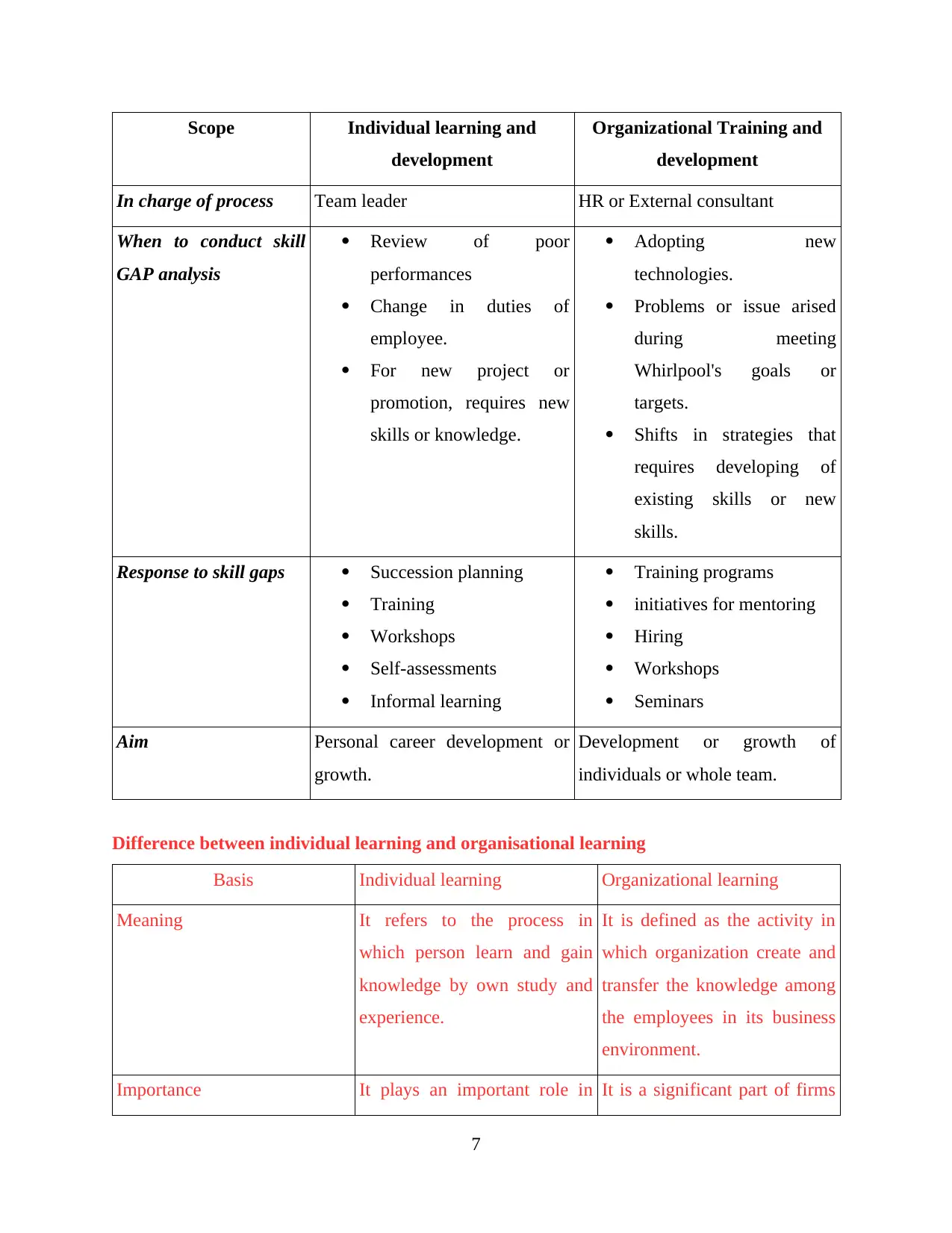
Scope Individual learning and
development
Organizational Training and
development
In charge of process Team leader HR or External consultant
When to conduct skill
GAP analysis
Review of poor
performances
Change in duties of
employee.
For new project or
promotion, requires new
skills or knowledge.
Adopting new
technologies.
Problems or issue arised
during meeting
Whirlpool's goals or
targets.
Shifts in strategies that
requires developing of
existing skills or new
skills.
Response to skill gaps Succession planning
Training
Workshops
Self-assessments
Informal learning
Training programs
initiatives for mentoring
Hiring
Workshops
Seminars
Aim Personal career development or
growth.
Development or growth of
individuals or whole team.
Difference between individual learning and organisational learning
Basis Individual learning Organizational learning
Meaning It refers to the process in
which person learn and gain
knowledge by own study and
experience.
It is defined as the activity in
which organization create and
transfer the knowledge among
the employees in its business
environment.
Importance It plays an important role in It is a significant part of firms
7
development
Organizational Training and
development
In charge of process Team leader HR or External consultant
When to conduct skill
GAP analysis
Review of poor
performances
Change in duties of
employee.
For new project or
promotion, requires new
skills or knowledge.
Adopting new
technologies.
Problems or issue arised
during meeting
Whirlpool's goals or
targets.
Shifts in strategies that
requires developing of
existing skills or new
skills.
Response to skill gaps Succession planning
Training
Workshops
Self-assessments
Informal learning
Training programs
initiatives for mentoring
Hiring
Workshops
Seminars
Aim Personal career development or
growth.
Development or growth of
individuals or whole team.
Difference between individual learning and organisational learning
Basis Individual learning Organizational learning
Meaning It refers to the process in
which person learn and gain
knowledge by own study and
experience.
It is defined as the activity in
which organization create and
transfer the knowledge among
the employees in its business
environment.
Importance It plays an important role in It is a significant part of firms
7
⊘ This is a preview!⊘
Do you want full access?
Subscribe today to unlock all pages.

Trusted by 1+ million students worldwide
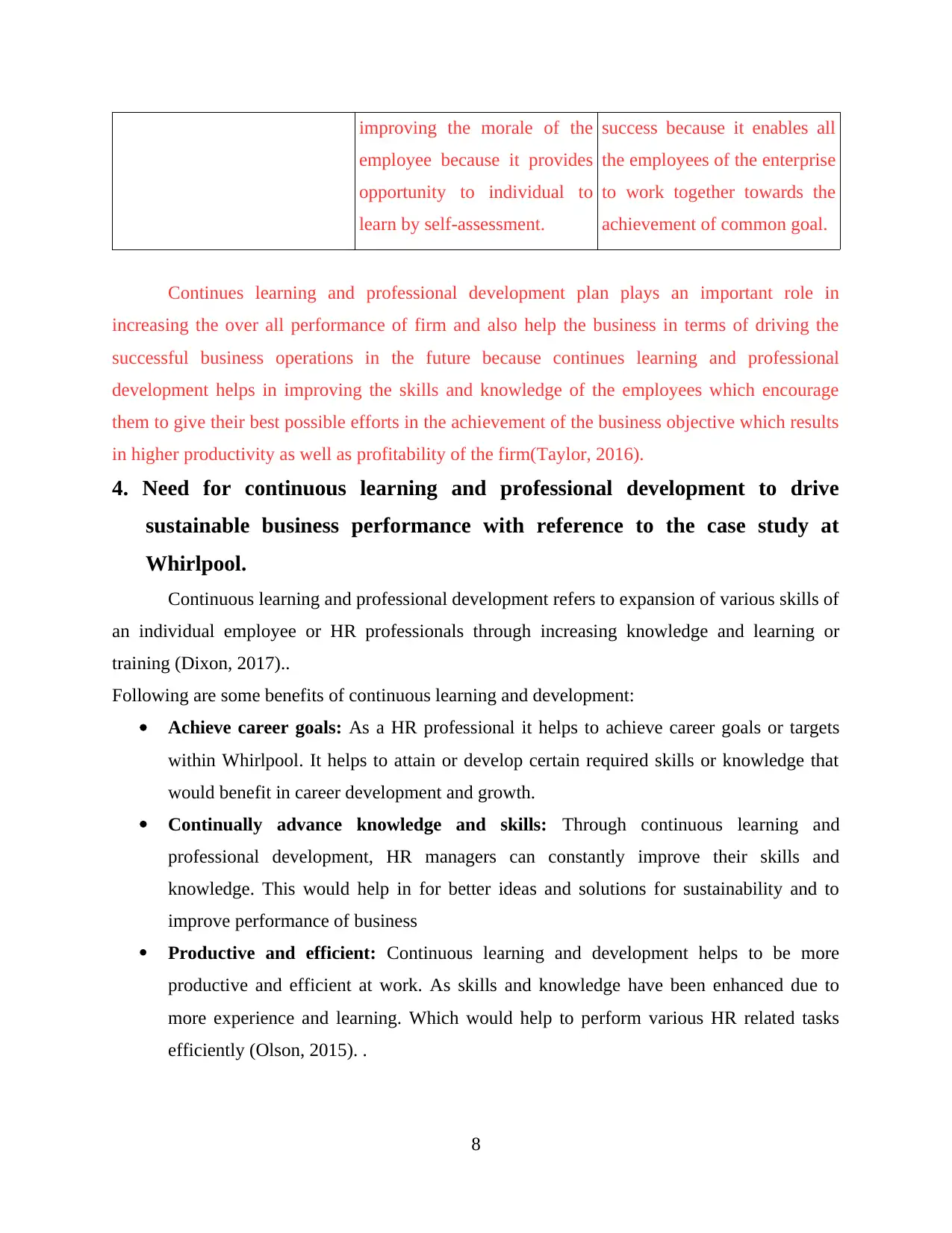
improving the morale of the
employee because it provides
opportunity to individual to
learn by self-assessment.
success because it enables all
the employees of the enterprise
to work together towards the
achievement of common goal.
Continues learning and professional development plan plays an important role in
increasing the over all performance of firm and also help the business in terms of driving the
successful business operations in the future because continues learning and professional
development helps in improving the skills and knowledge of the employees which encourage
them to give their best possible efforts in the achievement of the business objective which results
in higher productivity as well as profitability of the firm(Taylor, 2016).
4. Need for continuous learning and professional development to drive
sustainable business performance with reference to the case study at
Whirlpool.
Continuous learning and professional development refers to expansion of various skills of
an individual employee or HR professionals through increasing knowledge and learning or
training (Dixon, 2017)..
Following are some benefits of continuous learning and development:
Achieve career goals: As a HR professional it helps to achieve career goals or targets
within Whirlpool. It helps to attain or develop certain required skills or knowledge that
would benefit in career development and growth.
Continually advance knowledge and skills: Through continuous learning and
professional development, HR managers can constantly improve their skills and
knowledge. This would help in for better ideas and solutions for sustainability and to
improve performance of business
Productive and efficient: Continuous learning and development helps to be more
productive and efficient at work. As skills and knowledge have been enhanced due to
more experience and learning. Which would help to perform various HR related tasks
efficiently (Olson, 2015). .
8
employee because it provides
opportunity to individual to
learn by self-assessment.
success because it enables all
the employees of the enterprise
to work together towards the
achievement of common goal.
Continues learning and professional development plan plays an important role in
increasing the over all performance of firm and also help the business in terms of driving the
successful business operations in the future because continues learning and professional
development helps in improving the skills and knowledge of the employees which encourage
them to give their best possible efforts in the achievement of the business objective which results
in higher productivity as well as profitability of the firm(Taylor, 2016).
4. Need for continuous learning and professional development to drive
sustainable business performance with reference to the case study at
Whirlpool.
Continuous learning and professional development refers to expansion of various skills of
an individual employee or HR professionals through increasing knowledge and learning or
training (Dixon, 2017)..
Following are some benefits of continuous learning and development:
Achieve career goals: As a HR professional it helps to achieve career goals or targets
within Whirlpool. It helps to attain or develop certain required skills or knowledge that
would benefit in career development and growth.
Continually advance knowledge and skills: Through continuous learning and
professional development, HR managers can constantly improve their skills and
knowledge. This would help in for better ideas and solutions for sustainability and to
improve performance of business
Productive and efficient: Continuous learning and development helps to be more
productive and efficient at work. As skills and knowledge have been enhanced due to
more experience and learning. Which would help to perform various HR related tasks
efficiently (Olson, 2015). .
8
Paraphrase This Document
Need a fresh take? Get an instant paraphrase of this document with our AI Paraphraser
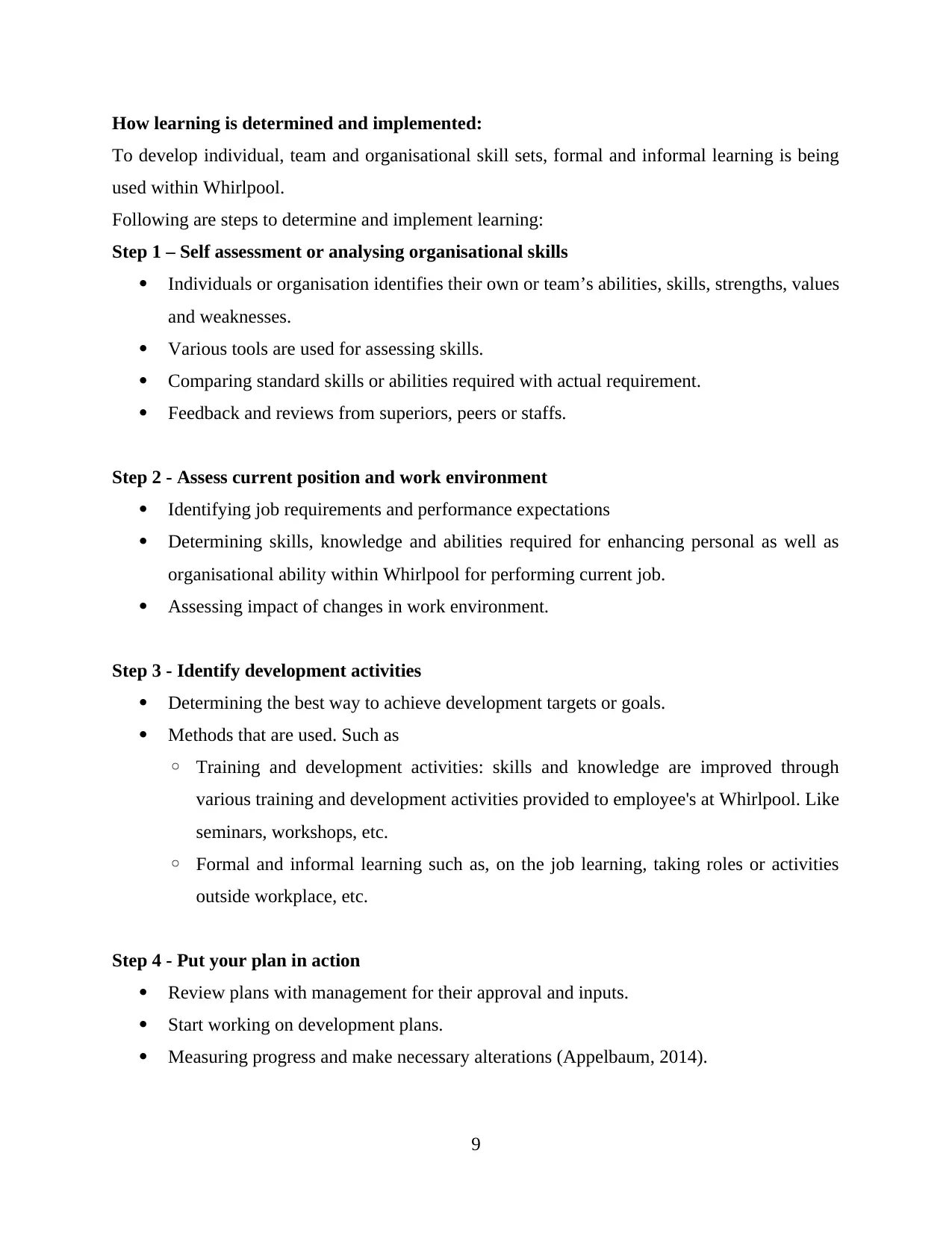
How learning is determined and implemented:
To develop individual, team and organisational skill sets, formal and informal learning is being
used within Whirlpool.
Following are steps to determine and implement learning:
Step 1 – Self assessment or analysing organisational skills
Individuals or organisation identifies their own or team’s abilities, skills, strengths, values
and weaknesses.
Various tools are used for assessing skills.
Comparing standard skills or abilities required with actual requirement.
Feedback and reviews from superiors, peers or staffs.
Step 2 - Assess current position and work environment
Identifying job requirements and performance expectations
Determining skills, knowledge and abilities required for enhancing personal as well as
organisational ability within Whirlpool for performing current job.
Assessing impact of changes in work environment.
Step 3 - Identify development activities
Determining the best way to achieve development targets or goals.
Methods that are used. Such as
◦ Training and development activities: skills and knowledge are improved through
various training and development activities provided to employee's at Whirlpool. Like
seminars, workshops, etc.
◦ Formal and informal learning such as, on the job learning, taking roles or activities
outside workplace, etc.
Step 4 - Put your plan in action
Review plans with management for their approval and inputs.
Start working on development plans.
Measuring progress and make necessary alterations (Appelbaum, 2014).
9
To develop individual, team and organisational skill sets, formal and informal learning is being
used within Whirlpool.
Following are steps to determine and implement learning:
Step 1 – Self assessment or analysing organisational skills
Individuals or organisation identifies their own or team’s abilities, skills, strengths, values
and weaknesses.
Various tools are used for assessing skills.
Comparing standard skills or abilities required with actual requirement.
Feedback and reviews from superiors, peers or staffs.
Step 2 - Assess current position and work environment
Identifying job requirements and performance expectations
Determining skills, knowledge and abilities required for enhancing personal as well as
organisational ability within Whirlpool for performing current job.
Assessing impact of changes in work environment.
Step 3 - Identify development activities
Determining the best way to achieve development targets or goals.
Methods that are used. Such as
◦ Training and development activities: skills and knowledge are improved through
various training and development activities provided to employee's at Whirlpool. Like
seminars, workshops, etc.
◦ Formal and informal learning such as, on the job learning, taking roles or activities
outside workplace, etc.
Step 4 - Put your plan in action
Review plans with management for their approval and inputs.
Start working on development plans.
Measuring progress and make necessary alterations (Appelbaum, 2014).
9
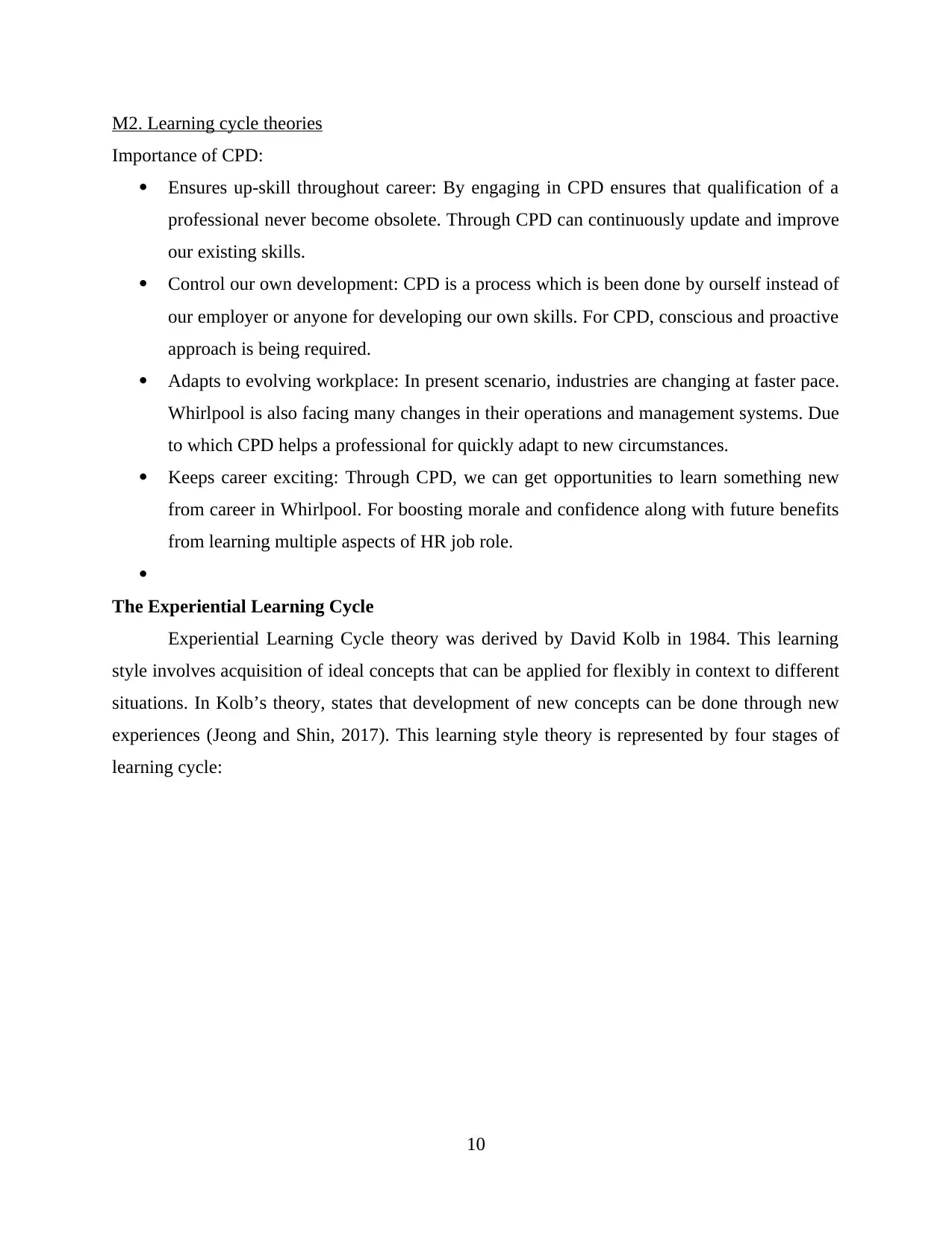
M2. Learning cycle theories
Importance of CPD:
Ensures up-skill throughout career: By engaging in CPD ensures that qualification of a
professional never become obsolete. Through CPD can continuously update and improve
our existing skills.
Control our own development: CPD is a process which is been done by ourself instead of
our employer or anyone for developing our own skills. For CPD, conscious and proactive
approach is being required.
Adapts to evolving workplace: In present scenario, industries are changing at faster pace.
Whirlpool is also facing many changes in their operations and management systems. Due
to which CPD helps a professional for quickly adapt to new circumstances.
Keeps career exciting: Through CPD, we can get opportunities to learn something new
from career in Whirlpool. For boosting morale and confidence along with future benefits
from learning multiple aspects of HR job role.
The Experiential Learning Cycle
Experiential Learning Cycle theory was derived by David Kolb in 1984. This learning
style involves acquisition of ideal concepts that can be applied for flexibly in context to different
situations. In Kolb’s theory, states that development of new concepts can be done through new
experiences (Jeong and Shin, 2017). This learning style theory is represented by four stages of
learning cycle:
10
Importance of CPD:
Ensures up-skill throughout career: By engaging in CPD ensures that qualification of a
professional never become obsolete. Through CPD can continuously update and improve
our existing skills.
Control our own development: CPD is a process which is been done by ourself instead of
our employer or anyone for developing our own skills. For CPD, conscious and proactive
approach is being required.
Adapts to evolving workplace: In present scenario, industries are changing at faster pace.
Whirlpool is also facing many changes in their operations and management systems. Due
to which CPD helps a professional for quickly adapt to new circumstances.
Keeps career exciting: Through CPD, we can get opportunities to learn something new
from career in Whirlpool. For boosting morale and confidence along with future benefits
from learning multiple aspects of HR job role.
The Experiential Learning Cycle
Experiential Learning Cycle theory was derived by David Kolb in 1984. This learning
style involves acquisition of ideal concepts that can be applied for flexibly in context to different
situations. In Kolb’s theory, states that development of new concepts can be done through new
experiences (Jeong and Shin, 2017). This learning style theory is represented by four stages of
learning cycle:
10
⊘ This is a preview!⊘
Do you want full access?
Subscribe today to unlock all pages.

Trusted by 1+ million students worldwide
1 out of 20
Related Documents
Your All-in-One AI-Powered Toolkit for Academic Success.
+13062052269
info@desklib.com
Available 24*7 on WhatsApp / Email
![[object Object]](/_next/static/media/star-bottom.7253800d.svg)
Unlock your academic potential
Copyright © 2020–2026 A2Z Services. All Rights Reserved. Developed and managed by ZUCOL.





